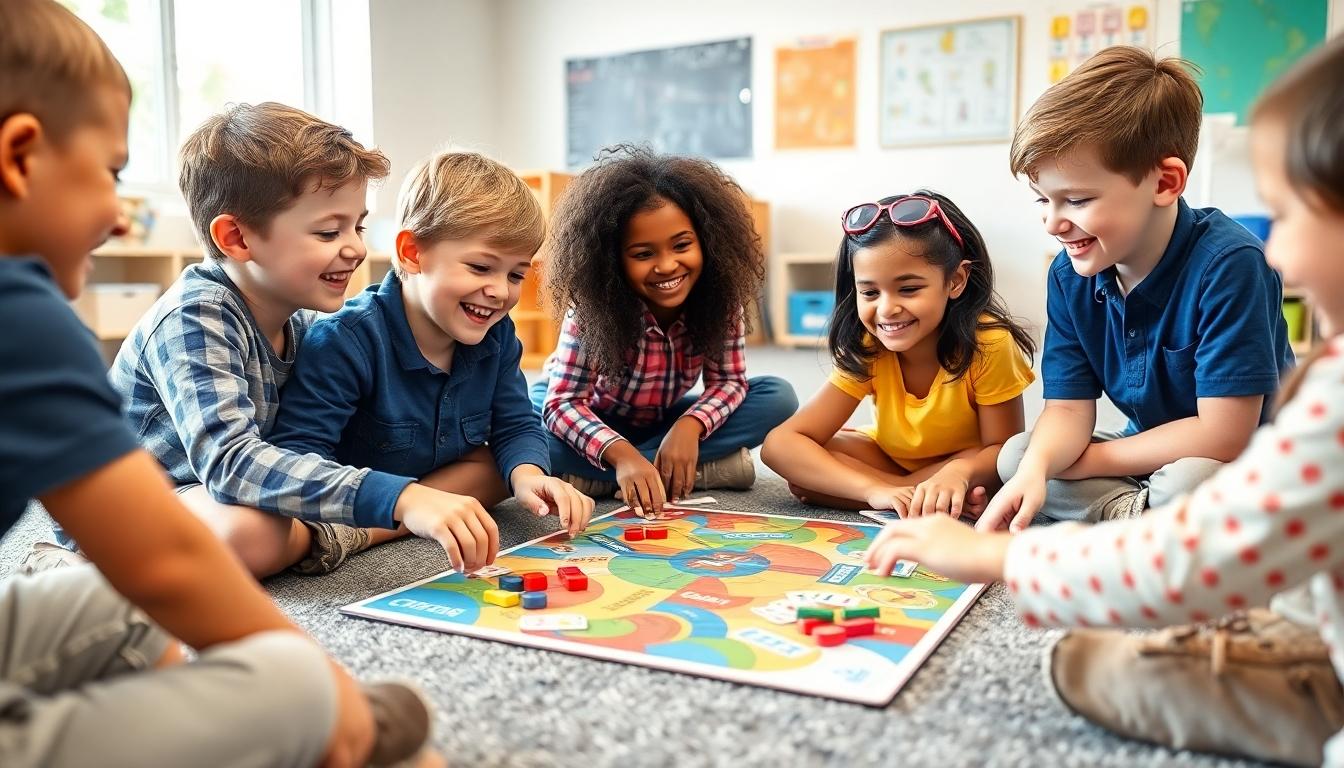Building good habits can feel like trying to teach a cat to fetch—challenging and often comical. But what if there was a way to make this process fun and engaging for kids? Enter habit building games! These interactive tools not only entertain but also instill valuable life skills in the little ones.
Table of Contents
ToggleOverview of Habit Building Games for Kids
Habit building games engage children in developing essential life skills while making the learning process enjoyable. These games often incorporate elements of play, competition, and problem-solving, which capture children’s attention and motivate them to participate actively.
Developing habits takes time and consistency; integrating games into daily routines can simplify this process. For example, games that focus on organization teach kids to tidy up their spaces. Fun challenges involving time management encourage punctuality and responsibility.
Some notable habit building games include chore charts, digital apps, and board games designed to instill good habits. Each game serves a specific purpose, reinforcing habits like cleanliness, personal responsibility, and teamwork. Children respond positively when they associate habit formation with enjoyable activities.
Using rewards as incentives also boosts engagement. Implementing a point system for completed tasks can motivate kids to reach their goals. Examples include stickers, small prizes, or extra playtime, which make tracking progress more appealing.
Parents and educators can customize games to suit individual needs. Tailoring activities to address specific habits ensures children remain engaged throughout the learning process. Effectively adapting situations increases the likelihood of long-lasting behavioral changes.
Research shows that active participation in habit building games positively influences children’s ability to form lasting habits. Children who frequently engage in these games display improved focus, discipline, and time management skills over time. These skills not only benefit them in their academic endeavors but also prepare them for future challenges in life.
Benefits of Habit Building Games

Habit building games offer significant benefits for children, enhancing various aspects of their development.
Cognitive Development
Cognitive skills improve through engaging in habit building games. Games often require problem-solving and critical thinking, promoting sharp mental abilities. Children tackle challenges, stimulating their brains while they develop essential thinking patterns. Studies show that active participation in these games fosters memory retention and attention span. Moreover, routine completion of tasks through gaming strategies cultivates organization and planning skills, essential for academic success. Parents can track progress, reinforcing skills learned during gameplay.
Social Skills Enhancement
Social skills flourish in a gaming environment. Games often involve teamwork, encouraging cooperation and communication among peers. Children learn to share responsibilities, fostering a sense of community and belonging. Interaction with others builds empathy and conflict resolution skills, which are crucial in various social settings. Research highlights that children engaged in group games demonstrate improved relationships with peers, contributing to their emotional intelligence. Incorporating friendly competition also teaches sportsmanship and respect for others, fostering a healthy social dynamic.
Types of Habit Building Games
Habit building games fall into various categories, each serving unique purposes and engaging kids differently. By exploring these types, parents and educators can find the right fit for their children.
Digital Games
Digital games offer interactive platforms designed to teach children essential habits. Many apps incorporate rewards and progress tracking, reinforcing desired behaviors. Games like Habitica and Todoist cater to different age groups, making habit formation dynamic and fun. Features often include customizable avatars, challenges, and rewards, which keep kids motivated. Utilizing technology for habit building also prepares children for a tech-centric world, making learning enjoyable and relevant.
Board Games
Board games present an excellent avenue for fostering habits in a structured environment. Classic games like “The Game of Life” provide opportunities for strategic thinking and planning. Games that involve chores or responsibilities, like “Chore Bingo,” encourage accountability while children play interactively. Other educational board games focus on time management, helping kids understand the importance of deadlines and organization. Engaging in these board games promotes social interaction and teamwork, essential elements in habit formation.
Outdoor Activities
Outdoor activities serve as a practical way for children to practice habits while staying active. Games like scavenger hunts or nature walks emphasize exploration, encouraging curiosity and observational skills. Participating in group activities, such as relay races, builds teamwork and communication abilities. Turning outdoor tasks into games fosters a sense of responsibility toward the environment and community. Engaging in these activities also promotes physical health, reinforcing the holistic approach to habit building.
Popular Habit Building Games for Kids
Habit building games provide children with enjoyable ways to learn essential life skills while having fun. Here are two popular games that stand out for their effectiveness and engagement.
Game 1: Overview and Benefits
Chore Bingo combines the excitement of bingo with everyday tasks, encouraging children to complete chores. Players receive bingo cards with various chores listed. Completing a chore allows them to mark it off, making task completion a game. This fosters motivation through a competitive spirit while teaching organization and accountability. Kids experience satisfaction when getting a bingo, promoting a strong sense of accomplishment. Chore Bingo also encourages teamwork when played as a family, enhancing cooperation and communication skills among members.
Game 2: Overview and Benefits
Habitica transforms habit building into an interactive role-playing game. Players create avatars and earn rewards for completing daily tasks and forming positive habits. By converting real-life activities into game mechanics, children stay engaged and motivated to stick to their goals. Customizable characters provide a personal touch, making the experience more enjoyable. Habitica facilitates tracking progress visually, reinforcing the connection between effort and achievement. Children also develop planning and time management skills, crucial for academic success and future responsibilities.
Tips for Encouraging Game Play
Incorporating game play into daily routines enhances engagement and promotes habit development. Create a designated game time each day, allowing children to anticipate and prepare for this activity. Establish clear objectives for each game, which provides children with a sense of purpose and motivation.
Utilize rewards effectively to incentivize participation and completion of tasks. Stickers and extra playtime resonate well with children, reinforcing their commitment to habit development. Encourage family participation to increase motivation and make game play enjoyable. Working together fosters cooperation and strengthens familial bonds.
Allow for customization of games to cater to individual preferences and unique learning styles. Personalizing game elements enhances their relevance, leading to better engagement. Regular encouragement during play helps children feel supported and reinforces positive behavior.
Introduce subtle challenges, such as timed tasks or friendly competition, to keep children invested in the experience. Changing game rules from time to time also maintains interest and provides fresh experiences. Celebrate achievements, no matter how small, to build confidence and promote a sense of accomplishment.
Involve children in the selection of games, which empowers them and fosters ownership of their learning process. Discuss the benefits of each game, helping them understand how these activities contribute to skill development. Use storytelling to relate games to real-life scenarios, making lessons more memorable and applicable.
Observation plays a key role in determining which games resonate most. Monitoring children’s reactions and adjusting approaches accordingly leads to a more effective experience. Continuous feedback encourages ongoing adaptation and ensures habit-building games remain engaging and impactful.
Habit building games offer a unique and effective way for children to develop essential skills while having fun. By engaging in activities that promote organization, teamwork, and problem-solving, kids can cultivate habits that will benefit them throughout their lives. The diverse types of games available ensure there’s something for every child, allowing for a personalized approach to learning.
Incorporating these games into daily routines not only enhances motivation but also strengthens family bonds and social skills. As children navigate these interactive experiences, they build a strong foundation for future challenges. Embracing habit building games is a step toward fostering well-rounded, disciplined individuals ready to take on the world.





